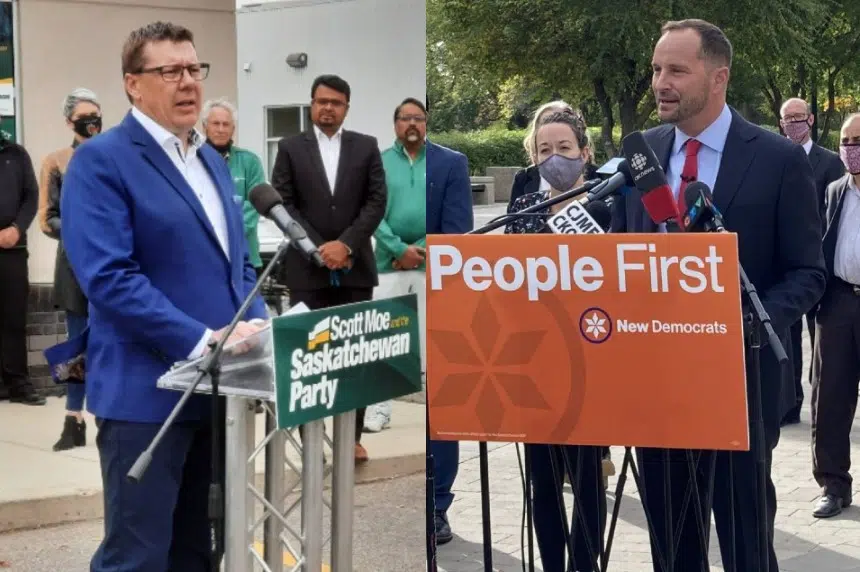The Saskatchewan NDP’s latest election promise involves tackling the mental health and addictions crisis in the province.
The Saskatchewan Party, meanwhile, plans to offer more assistance to seniors.
NDP Leader Ryan Meili said Thursday that, if elected, his party would commit a total of $9.8 million towards access and strategies linked to the crisis.
Of that, $7.8 million would go to create dedicated mental health emergency rooms in Saskatoon, Regina, Prince Albert and Moose Jaw.
An additional $2 million is earmarked to develop and implement an “evidence-based” strategy for the province’s opioid and crystal meth crisis, which would focus on awareness and harm reduction.
A legislated suicide prevention strategy is also a part of Thursday’s commitment.
“Every family has been touched in some way by depression, by anxiety (and) by addictions. We have a mental health and addictions crisis in this province. It’s hurting families and it’s hurting our communities,” Meili said during a campaign stop in Saskatoon.
Meili said this is not a part of the NDP’s election promise of $1.3 million to Saskatoon’s Safe Consumption Site, which currently isn’t funded by the provincial government.
Joining Meili at Thursday’s Kinsmen Park media conference were two mothers, Marie Agioritis and Marilyn Irwin of Mothers Stop the Harm.
Agioritis said she nearly lost two of her sons to addictions in the past.
“We nearly lost two boys, and after tens of thousands of dollars spent out of province, we were able to save one,” she explained. “(The current system) is loaded with gaps, it is deeply underfunded, and uses archaic, outdated models of care in the treatment for those suffering.”
Agioritis then pointed to the high number of overdoses — a number that’s continuing to climb.
“Young men in the trades still attribute to the highest demographic of loss,” she explained. “Death by suicide and addiction is far exceeding the numbers of deaths we expect to see from the other health-care crisis we are battling, a virus (COVID-19), and we need leaders that recognize both, not just one of them.”
Meili said the NDP is going to work with the Saskatchewan Health Authority in identifying how to best roll out the mental health emergency rooms.
That includes the locations and number of beds in each location.
“Perhaps we could use City Hospital (in Saskatoon), make a different use of this emergency room which is underutilized, but we’ll work with the health authority to identify the best way to do this, whether that’s new builds or in existing facilities,” he explained.
Meili said in emergency rooms now, patients with mental health challenges often have to wait longer. He said they are mixed in with the “heart attacks and the broken arms.”
He said the plan could ensure the pressure is taken off emergency rooms and rolling out specialized care to help people in crisis.
Twice, the NDP introduced legislation on a suicide prevention strategy, but they were ultimately defeated.
Sask. Party vows to assist seniors
In North Battleford, Sask. Party Leader Scott Moe said his party, if re-elected, would implement three measures to assist seniors.
One would lower the cost of ambulance calls for seniors.
Moe said his government would eliminate charges for interhospital ambulance calls for seniors and reduce the maximum cost of other ambulance calls for seniors by more than 50 per cent. That cost would drop from a maximum of $275 per call to $135 per call.
According to the Sask. Party, there are about 50,000 ambulance calls involving seniors in the province each year.
“We understand that ambulance costs can be difficult for Saskatchewan seniors,” Moe said in a media release. “That’s why we are cutting ambulance charges in half and eliminating them altogether for ambulance transfers from one hospital to another.”
Moe said the reduction in ambulance costs would take effect in December and would cost $8.4 million per year.
The Sask. Party also promised to increase the maximum monthly benefit to low-income seniors in the Seniors Income Plan from $270 per month to $360 per month over the next four years.
That change would assist about 14,000 Saskatchewan seniors.
“When the Saskatchewan Party was first elected in 2007, the Seniors Income Plan benefit was just $90 a month and hadn’t been increased one dime in 16 years under the NDP,” Moe said. “Since then, our government has tripled it to $270 a month and by the end of our next term, we will have quadrupled it to $360 a month.”
The increase to the Seniors Income Plan benefits would be phased in over three years starting in 2021 and would cost $9 million per year when fully implemented.
Finally, the Sask. Party promised to hire 300 more continuing care aides to help seniors in the province’s long-term care facilities and those living in their own homes.
That breaks down to 180 continuing care aides in long-term care facilities and 120 for home-care services.
The new positions would be added following the 2021-22 budget and would cost $18.4 million per year.







